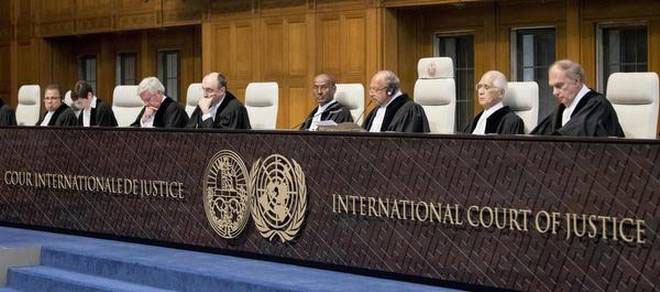
September 25, 2019
The International Court of Justice (ICJ) has set a date for Oral Hearings on jurisdiction in the case of the long-running border controversy between this country and Venezuela.
According to a statement from the Ministry of Foreign Affairs the ICJ has notified Guyana that hearings will be held in The Hague, the Netherlands from March 23 to 27, 2020.
It will determine whether the Court has jurisdiction over the case filed by Guyana on March 29, 2018 to obtain from the Court a final and binding judgment that the 1899 Arbitral Award, which established the location of the land boundary between then-British Guiana and Venezuela, remains valid and binding, and that Guyana’s Essequibo region belongs to Guyana, and not Venezuela.
Guyana brought its case to the Court following the decision by the Secretary-General of the United Nations, in January 2018, that the controversy between Guyana and Venezuela should be decided by the World Court. In taking his decision, the Secretary-General was exercising the power vested in him in the 1966 Geneva Agreement between Guyana, Venezuela and the United Kingdom to decide how the controversy should be settled.
While Venezuela has claimed, in a letter to the Court, that the Secretary-General exceeded his authority under the Geneva Agreement, and that the Court therefore lacks jurisdiction to adjudicate Guyana’s lawsuit, Guyana has submitted a Memorial refuting these arguments and demonstrating that the Court has jurisdiction.
The Memorial which was submitted on November 19, 2018 argues that there is no basis to Venezuela’s contention that the means of settlement listed in Article 33 of the UN Charter must be selected by the Secretary-General successively, so that the means listed ahead of judicial settlement have to be utilised before recourse to the Court can be chosen.
“Nothing in the text of Article IV of the Geneva Agreement, which provides a menu of options, not a predetermined sequence, supports Venezuela’s interpretation. Nor is Venezuela correct in arguing that, as it has recently asserted, the controversy must be resolved exclusively by friendly negotiations, a claim that is belied by the express terms of the Geneva Agreement and contemporaneous statements by the parties during its negotiation and ratification”, a statement released at that time said.
Guyana prepared its Memorial bearing in mind the Court’s edict that it should be informed of all the legal and factual grounds on which the parties rely in the matter of its jurisdiction. Guyana’s submission therefore sets out, the ministry said, how the boundary with Venezuela was determined by an arbitral tribunal constituted pursuant to a treaty concluded by Venezuela and Great Britain in 1897.
The ministry’s November statement noted that Venezuela accepted this unanimous award, which was delivered by five eminent jurists on 3 October 1899, celebrated its outcome, participated in a joint commission to demarcate the boundary on the ground, and insisted on the strict implementation of the award.
Only decades later, the statement noted did Venezuela, in anticipation of Guyana’s independence, cease recognizing the award’s validity and binding nature, using that pretext to claim more than two-thirds of Guyana’s territory.
Government yesterday welcomed the prospect of a final and binding decision by the Court noting that under well-established judicial precedent, the Court will proceed to decide if it has jurisdiction over Guyana’s claims, irrespective of whether or not Venezuela participates in the proceedings.
Venezuela has indicated that it will not participate in the proceedings.
“If it decides that it has jurisdiction, the Court will proceed to rule on the merits of those claims, and decide whether the validity of the 1899 Arbitral Award and the border between the two States should be confirmed. Under the United Nations Charter and the Court’s own rules, its final judgments both on jurisdiction and the merits will be legally binding on Guyana and Venezuela, whether or not Venezuela participates in the proceedings. Nevertheless, Guyana expresses the hope that Venezuela will participate, to indicate respect for the Court and the international rule of law, the peaceful settlement of disputes, and the promotion of friendly relations between both States,” the Ministry concluded.
